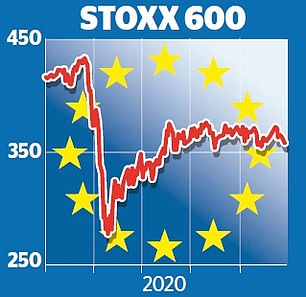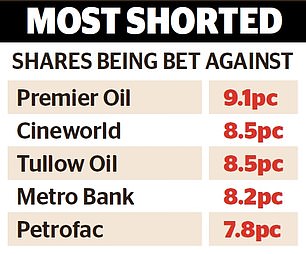Is Europe next stop for towering profits? After making a pile on US tech, many investors are now looking to firms on the Continent to boost their capital
As the rows continue over the terms of our exit from the European Union, now could be the moment to reconsider investing on the Continent.
Many people who have made a pile in US tech are looking for new opportunities. And these could be on offer in European markets, even amid Brexit apprehension and mounting Covid-19 anxiety.
Such a diversification requires strong nerves, however. Following a record GDP rebound in the third quarter, economists are cutting their fourth-quarter forecasts, in response to Covid restrictions.
The Stoxx 600 share index contains some booming businesses such as Logitech, the Swiss-US maker of computer handsets and keyboards, whose third-quarter sales were up 75 per cent
The French capital may be known as the city of light but is currently dark, its cafes shuttered.
The Stoxx 600 share index, which includes companies of all sizes in 17 EU and non-EU member states, is in an unhappy condition, weighed down by banks and utility groups whose profits are falling.
Yet it also contains some booming businesses such as Logitech, the Swiss-US maker of computer handsets and keyboards, whose third-quarter sales were up 75 per cent.
Since January, its shares have leapt from 46 Swiss francs to 81 Swiss francs.
The achievements of such European tech groups rarely hit the headlines, unlike Wirecard, the fraudulent German payments group which collapsed in June.

Without this infamous business, the Dax, the German index, has done fairly well, as Nick Peters, multi-asset manager at Fidelity, points out.
China’s strong revival is a boon to the Dax, which is full of exporters like Volkswagen.
Over the next few weeks, the focus will be on the fortunes of household names like luxury goods conglomerate LVMH, along with lesser-known giants such as Covestro, the German polymer manufacturer.
These two may have delivered third-quarter profit increases. But can they, and other companies that have bounced back, sustain this performance?
Peters says that analysts believe 2021 should be a better year, on the basis that EU governments will continue to rely on local lockdowns to limit the damage to their economies, rather than national ones.
Aiding this resurgence will be the €750billion (£576billion) EU recovery fund, which is targeted at struggling countries.
Of course, closer unity may not be the consequence of this subsidy for the South, financed by the thrifty North.
Jamie Ross, portfolio manager of Henderson Euro Trust, asks: ‘Will this transfer of wealth bring the EU closer together? Or will it spark angst over the continuation of the European project?’
Good question. Yet whatever the fate of the EU, Ross argues that Europe has many businesses set to prosper from lifestyle changes taking hold around the world, spurred by lockdown.
Amazon and the rest of its Silicon Valley ilk are not the only winners from the shift to online.
Ross lists Embracer, the Swedish gaming company whose shares have doubled in 12 months, along with Scout 24, Germany’s equivalent to Rightmove.
He also likes Zur Rose, the Swiss ecommerce pharmacy and Delivery Hero, the German food delivery group which operates in Europe and Africa, America, Asia and the Middle East.

Delivery Hero is loss-making but analyst Sherri Malek of RBC – which rates the shares as a buy – believes that they could rise significantly, as more households prefer to let someone else do the cooking.
Rather than holding traditional bank shares, Ross prefers outfits like Nexi, an Italian payments business and Prosus, the Dutch tech investor which has a 31 per cent stake in Tencent, owner of the Chinese We Chat app with its 1.7billion users.
Buying shares in Prosus, which stand at €80, up from €68 at the start of the year, combines a bet on Europe with a cheap-ish way into booming Tencent.
Anyone now wondering how to get more exposure to Europe could look at Fundsmith, that small investor favourite (of which I am a holder). Its second-largest holding is Danish pharmaceutical company Novo Nordisk.
Since March, its shares have risen from 352 Danish krone to 446 Danish krone, driven by demand during the pandemic.
Baillie Gifford European Growth, another popular trust, has Prosus, plus Berlin-based Zalando, the fashion site whose shares have moved from €41 to €84 over the past 12 months.
Fidelity Europe owns Nestle, which has this week reported stronger-than-expected growth, propelled by a lockdown love for pasta and pizza.
If you already have many of these holdings, Interactive Investor’s adventurous recommendation is TM Crux European Special Situations. Worth a look whether you will be celebrating on December 31, or not.

